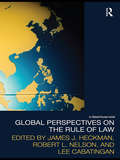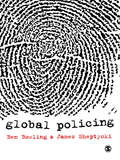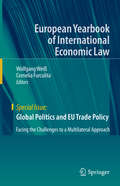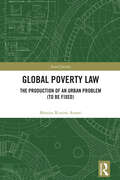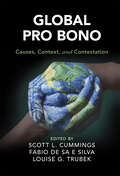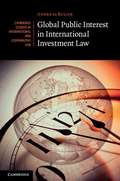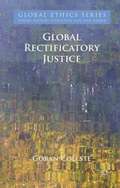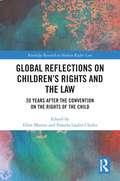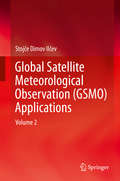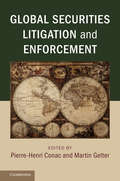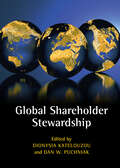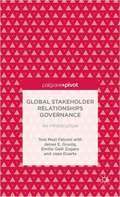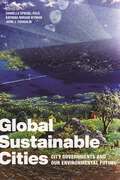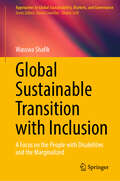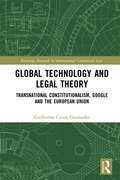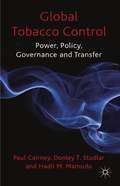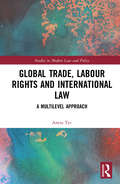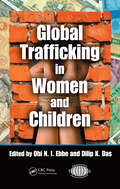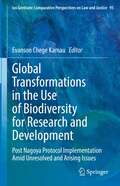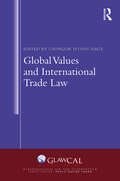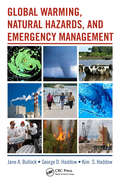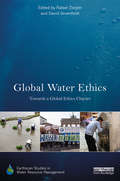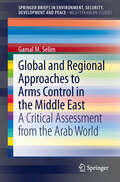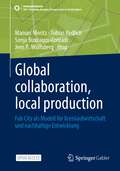- Table View
- List View
Global Perspectives on the Rule of Law (Law, Development and Globalization)
by James J. Heckman Robert L. Nelson Lee CabatinganGlobal Perspectives on the Rule of Law is a collection of original research on the rule of law from a panel of leading economists, political scientists, legal scholars, sociologists and historians. The chapters critically analyze the meaning and foundations of the rule of law and its relationship to economic and democratic development, challenging many of the underlying assumptions guiding the burgeoning field of rule of law development. The combination of jurisprudential, quantitative, historical/comparative, and theoretical analyses seeks to chart a new course in scholarship on the rule of law: the volume as a whole takes seriously the role of law in pursuing global justice, while confronting the complexity of instituting the rule of law and delivering its promised benefits. Written for scholars, practitioners, and policy-makers, Global Perspectives on the Rule of Law offers a unique combination of jurisprudential and empirical research that will be provocative and relevant to those who are attempting to understand and advance the rule of law globally. The chapters progress from broad questions regarding current rule of development efforts and the concept of rule of law to more specific issues pertaining to economic and democratic development. Specific countries, such as China, India, and seventeenth century England and the Netherlands, serve as case studies in some chapters, while broad global surveys feature in other chapters. Indeed, this impressive scope of research ushers in the next generation of scholarship in this area.
Global Policing: Police Power In Global Context (Onati International Series In Law And Society Ser.)
by James W.E. Sheptycki Ben BowlingIn the transitional networked society, police power is no longer constrained by the borders of the nation state. It has globalised. Global Policing shows how security threats have been constructed by powerful actors to justify the creation of a new global policing architecture and how the subculture of policing shapes the world system. Demonstrating how a theory of global policing is central to understanding global governance, the text explores: - the 'new security agenda' focused on serious organised crime and terrorism and how this is transforming policing - the creation of global organisations such as Interpol, regional entities such as Europol, and national policing agencies with a transnational reach - the subculture of the 'global cops', blurring boundaries between police, private security, military and secret intelligence agencies - the reality of transnational policing on the ground, its effectiveness, legitimacy, accountability and future development. Written by two leading international experts who bring cutting-edge theoretical debates to life with case studies and examples, Global Policing will prove captivating reading for students and scholars in criminology, criminal justice, international relations, law and sociology.
Global Politics and EU Trade Policy: Facing the Challenges to a Multilateral Approach (European Yearbook of International Economic Law)
by Wolfgang Weiß Cornelia FurculitaThis book explores how the European Union designs its trade policy to face the most recent challenges and to influence global policy issues. It provides with an interdisciplinary perspective, by combining legal, political, and economic approaches. It studies a broad set of trade instruments that are used by the EU in its trade policy, such as: trade agreements, multilateral initiatives, unilateral trade policies, as well as, internal market tools. Therefore, the contributions to this volume present the EU’s Trade Policy through different lenses providing a complex view of it.
Global Poverty Law: The Production of an Urban Problem (To Be Fixed) (ISSN)
by Moniza Rizzini AnsariThis book demonstrates how the various legal efforts employed to eradicate global urban poverty also play a significant role in shaping it.Urban poverty has been widely examined as a social problem that requires attention and social commitment. Law is often seen as both an important contributor to the problem as well as a source of crucial tools to overcome it. In spite of this, however, poverty is surprisingly disregarded within legal scholarship. This book counters this by drawing on legal theory, legal history, and legal geography to inquire how urban poverty is made visible and invisible as a problem across global cities. More specifically, it investigates the mechanisms and networks through which global urban poverty has been conceptually and materially shaped in a way that fits the remit of global corporate philanthropy and the development aid agenda. By following law’s circuitous interactions with poverty knowledge and antipoverty interventions, the book demonstrates how it plays a historical role in making poverty seen, known, and remedied. As a result, the book argues, law consolidates a stable image of poverty as an essential ‘problem’ – to be uniformly found worldwide and so reasonably fixable with the appropriate legal reforms. Taking poverty to be a fundamental manifestation of social injustice, the book thus raises key questions about the role of law in the achievement of social justice.This innovative and insightful account of the relationship between law and poverty will appeal to scholars in critical and socio-legal studies, as well as others working in poverty studies, urban studies, development studies, geography, sociology, and social policy.
Global Pro Bono: Causes, Context, and Contestation
by Scott L. Cummings Louise G. Trubek de Sa e Silva, FabioThe principle and practice of pro bono, or volunteer legal services for poor and other marginalized groups, is an increasingly important feature of civil justice systems around the world. Recent surveys have identified pro bono initiatives in more than eighty countries—including Colombia, Portugal, Nigeria, and Singapore—and the list keeps growing. Covering the spread of pro bono in across five continents, this book provides a unique comparative dataset permitting the first-ever analysis of pro bono's growing role in access to justice globally. The contributors are leading experts from around the world, whose chapters explore both the internal roots of and global influences on pro bono in transnational context. Global Pro Bono explores the dramatically expanding geographical and political reach of pro bono: documenting its essential contribution to bringing more justice to those on the margins, while underscoring its complex and contested meaning in different parts of the world.
Global Public Interest in International Investment Law
by Andreas KulickThe strengths of international investment law - above all, a strong focus on investor interests and an effective adjudication and enforcement system - also entail its weaknesses: it runs the danger of impeding or even sanctioning the host states' legitimate regulatory interests and ignoring other fields of public international law. How does it cope with public interest concerns such as human rights, the environment or the fight against corruption? At the heart of this book lies a fresh approach towards a general theory of such global public interest considerations in the investment realm. Delineating how and why those considerations matter, and why the current system does not accommodate them properly, Andreas Kulick fleshes out general principles and customary international law as defences the host state may raise against alleged investor rights infringements and promotes proportionality as the appropriate balancing mechanism.
Global Rectificatory Justice (Global Ethics Series )
by Göran CollsteWhat are the implications of colonialism for a theory of global justice today? What does rectificatory justice mean in the light of colonialism? What does global rectificatory justice require in practice? The author seeks to answer these questions covering a significant gap in the literature on global justice.
Global Reflections on Children’s Rights and the Law: 30 Years After the Convention on the Rights of the Child (Routledge Research in Human Rights Law)
by Ellen Marrus Pamela Laufer-UkelesThirty years after the adoption of the UN Convention of the Rights of the Child, this book provides diverse perspectives from countries and regions across the globe on its implementation, critique and potential for reform. The book revolves around key issues including progress in implementing the CRC worldwide; how to include children in legal proceedings; how to uphold children’s various civil rights; how to best assist children at risk; and discussions surrounding children’s identity rights in a changing familial order. Discussion of the CRC is both compelling and polarizing and the book portrays the enthusiasm around these topics through contrasting and comparative opinions on a range of topics. The work provides varying perspectives from many different countries and regions, offering a wealth of insight on topics that will be of significant interest to scholars and practitioners working in the areas of children’s rights and justice.
Global Satellite Meteorological Observation (GSMO) Applications: Volume 2
by Stojče Dimov IlčevThis book presents principal structures of space systems functionality of meteorological networks, media and applications for modern remote sensing, transmission systems, meteorological ground and users segments and transferring weather data from satellite to the ground infrastructures and users. The author presents techniques and different modes of satellite image interpretation, type of satellite imagery, spectral imaging properties, and enhancement of imaging technique, geo-location and calibration, atmospheric and surface phenomena. Several satellite meteorological applications are introduced including common satellite remote sensing applications, weather analysis, warnings and prediction, observation and measurements of meteorological variables, atmosphere and surface applications, ocean and coastal applications, land, agriculture and forestry applications, and maritime and aviation satellite weather applications. The author also covers ground segment and user segment in detail. The final chapter looks to the future, covering possible space integrations in meteorological and weather observation.This is a companion book of Global Satellite Meteorological Observation Theory (Springer), which provides the following topics:Evolution of meteorological observations and history satellite meteorologySpace segment with satellite orbits and meteorological payloadsAnalog and digital transmission, type of modulations and broadcasting systemsAtmospheric radiation, satellite meteorological parameters and instrumentsMeteorological antenna systems and propagation
Global Securities Litigation and Enforcement
by Pierre-Henri Conac Martin GelterGlobal Securities Litigation and Enforcement provides a clear and exhaustive description of the national regime for the enforcement of securities legislation in cases of misrepresentation on financial markets. It covers 29 jurisdictions worldwide, some of them are important although their law is not well known. It will be an invaluable resource for academics and students of securities litigation, as well as for lawyers, policy-makers and regulators. The book also provides a comprehensive contribution debate on whether public or private enforcement is preferable in terms of development of securities markets. It will appeal to those interested in the legal origins theory and in comparative securities law, and shows that the classification of jurisdictions within legal families does not explain the differences in legal regimes. While US securities law often serves as a model for international convergence, some of its elements, such as securities class actions, have not been adopted worldwide.
Global Shareholder Stewardship
by Dan W. Puchniak Dionysia KatelouzouThis is the first in-depth comparative and empirical analysis of shareholder stewardship, revealing the previously unknown complexities of this global movement. It highlights the role of institutional investors and other shareholders, examining how they use their formal and informal power to influence companies. The book includes an in-depth chapter on every jurisdiction which has adopted a stewardship code and an analysis of stewardship in the world's two largest economies which have yet to adopt a code. Several comparative chapters draw on the rich body of jurisdiction-specific analyses, to analyze stewardship comparatively from multiple interdisciplinary perspectives. Ultimately, this book provides a cutting-edge and comprehensive understanding of shareholder stewardship which challenges existing theories and informs many of the most important debates in comparative corporate law and governance.
Global Stakeholder Relationships Governance: An Infrastructure
by James E. Grunig Toni Muzi Falconi Emilio Galli Zugaro Joao DuarteBy arguing and detailing the elements of a soft and hard infrastructure approach to the process of global stakeholder relationships governance, this book integrates advanced, flexible and feasible tools to develop an organization's listening culture; integrated reporting as an ongoing process of continued multi-stakeholder reporting.
Global Sustainable Cities: City Governments and Our Environmental Future
by Danielle Spiegel-Feld, Katrina Miriam Wyman, and John J. CoughlinPerspectives from worldwide experts on how major cities across the globe are responding to the major environmental threats of our time, including global climate change Over half of the world’s population now lives in cities, and this share is expected to increase in the coming decades. With growing urbanization, cities and their residents face substantial environmental challenges such as higher temperatures, droughts, wildfires, and increased flooding. In response to these pressing challenges, some cities have begun to develop local environmental regulations that supplement national and environmental laws. In so doing, cities have stepped into a role that has been historically dominated by higher levels of government.Global Sustainable Cities takes stock of the policies that have been implemented by cities around the world in recent years in several key areas: water, air pollution, greenhouse gas emissions, and climate adaptation. It examines the advantages—and potential drawbacks—of allowing cities to assume a significant role in environmental regulation, given the legal and political constraints in which cities operate.The contributors present a series of case studies of the actions that seven leading cities—Abu Dhabi, Beijing, Berlin, Delhi, London, New York, and Shanghai—are taking to improve their environments and adapt to climate change. The first volume of its kind, Global Sustainable Cities is a critical comparative assessment of the actions that major cities in the global North and South are taking to advance sustainability.
Global Sustainable Transition with Inclusion: A Focus on the People with Disabilities and the Marginalized (Approaches to Global Sustainability, Markets, and Governance)
by Wasswa ShafikThis book provides a comprehensive exploration of inclusive, sustainable development, emphasizing the critical need to integrate the perspectives and needs of people with disabilities and marginalized communities into the global sustainability transition to a sustainable future. Through highlighting the intersectionality of identity and the unique challenges faced by these groups, the book addresses a pressing issue: the often-overlooked barriers that hinder their full participation in sustainable transitions. Organized into three parts, the book first contextualizes the relationship between sustainability and inclusion. It delves into the historical and theoretical frameworks that shape our understanding of marginalization, exploring how disability intersects with various social identities. This foundation sets the stage for an in-depth analysis of the United Nations Sustainable Development Goals (SDGs) and the ways in which they can be made more inclusive, ensuring that no one is left behind. The second part identifies and examines the myriad barriers to inclusion within sustainable practices. It addresses structural, socioeconomic, and cultural obstacles that perpetuate exclusion while also critiquing existing policy frameworks for their limitations in addressing the needs of marginalized populations. Through case studies, the book highlights successful initiatives and innovative practices that promote accessibility and equity, mainly through the use of assistive technologies and community engagement. In the final section, the book outlines actionable strategies for fostering inclusive, sustainable development. It emphasizes the importance of community engagement, participatory decision-making, and the empowerment of marginalized voices. Additionally, it discusses metrics for monitoring and evaluating the impact of sustainability initiatives on people with disabilities, providing a framework for accountability and continuous improvement. This book aims to bridge the gap between sustainability and social justice, offering a roadmap for stakeholders, policymakers, and practitioners committed to creating a more inclusive world. This book targets academics, policymakers, non-profit societies, and activists working at the intersection of sustainability and social equity and serves as a vital resource for those seeking to understand and promote inclusive practices in the global sustainable transition.
Global Technology and Legal Theory: Transnational Constitutionalism, Google and the European Union (Routledge Research in International Commercial Law)
by Guilherme Cintra GuimarãesThe rise and spread of the Internet has accelerated the global flows of money, technology and information that are increasingly perceived as a challenge to the traditional regulatory powers of nation states and the effectiveness of their constitutions. The acceleration of these flows poses new legal and political problems to their regulation and control, as shown by recent conflicts between Google and the European Union (EU). <P><P> This book investigates the transnational constitutional dimension of recent conflicts between Google and the EU in the areas of competition, taxation and human rights. More than a simple case study, it explores how the new conflicts originating from the worldwide expansion of the Internet economy are being dealt with by the institutional mechanisms available at the European level. The analysis of these conflicts exposes the tensions and contradictions between, on the one hand, legal and political systems that are limited by territory, and, on the other hand, the inherently global functioning of the Internet. The EU’s promising initiatives to extend the protection of privacy in cyberspace set the stage for a broader dialogue on constitutional problems related to the enforcement of fundamental rights and the legitimate exercise of power that are common to different legal orders of world society. Nevertheless, the different ways of dealing with the competition and fiscal aspects of the conflicts with Google also indicate the same limits that are generally attributed to the very project of European integration, showing that the constitutionalization of the economy tends to outpace the constitutionalization of politics. <P><P> Providing a detailed account of the unfolding of these conflicts, and their wider consequences to the future of the Internet, this book will appeal to scholars working in EU law, international law and constitutional law, as well as those in the fields of political science and sociology.
Global Tobacco Control
by Paul Cairney Donley T. Studlar Hadii M. MamuduThe first major book by political scientists explaining global tobacco control policy. It identifies a history of minimal tobacco control then charts the extent to which governments have regulated tobacco in the modern era. It identifies major policy change from the post-war period and uses theories of public policy to help explain the change.
Global Trade, Labour Rights and International Law: A Multilevel Approach (Studies in Modern Law and Policy)
by Aneta TycThis book provides a set of proposals for how best to guarantee effective enforcement of labour rights worldwide. The linkage between labour standards and global trade has been recurrent for some 200 years. At a time when the world is struggling to find a way out of crisis and is striving for economic growth, more than ever there is a need for up-to-date research on how to protect and promote labour rights in the global economy. This book explores the history of the field and also provides an overview of emerging trends and opportunities. It discusses the most recent problems including: the effectiveness and the role of the International Labour Organization (ILO) in the second century of its existence, the World Trade Organization (WTO) and its potential relevance in the protection of labour rights, the effectiveness of the US and the EU Generalised System of Preferences, the impact of corporate social responsibility (CSR) instruments on labour rights, and labour provisions in the international trade agreements concluded by the US and the EU. The book argues, inter alia, that trade agreements seem to be a useful tool to help pave the way out of the crisis and that the United States–Mexico–Canada Agreement (USMCA) can be perceived as a model agreement and a symbol of a shift in perspective from long global supply chains to a focus on regional ones, local production, jobs and a rise in wages. The book will be essential reading for academics and students in the fields of human rights law, international labour law, industrial relations law, international sustainable development law, international economic law and international trade law. It will also be of interest to practitioners, non-government organisations (NGOs) and policy makers.
Global Trafficking in Women and Children (International Police Executive Symposium Co-Publications)
by Dilip K. Das Obi N. I. EbbeWar, poverty, and famine; political, social, and economic change; and the deep seated views and rituals rooted in a culture‘s history and traditions all contribute to the widespread and growing trafficking of women and children. The multilayered complexity, myriad contributing factors, enormous amount of money involved, and sheer magnitude of the
Global Transformations in the Use of Biodiversity for Research and Development: Post Nagoya Protocol Implementation Amid Unresolved and Arising Issues (Ius Gentium: Comparative Perspectives on Law and Justice #95)
by Evanson Chege KamauEnough laws have been enacted since the adoption of the Nagoya Protocol on access and benefit-sharing to permit a study which is capable of accurately portraying the status quo of national implementation of the Protocol and the ensuing practice, emerging challenges and how countries are coping with them. This book, one of the first to present such a study, uniquely combines an examination of the new laws and practice and how they comply with the Nagoya Protocol; of issues not yet resolved by the Protocol and which solutions are being explored; and of how research and development is responding to the new situation. In addition, it proposes solutions to selected questions on ABS based on real-world and hypothetical cases, which could instigate litigation.Written by a team of expert academics and practitioners in the field, this book makes a valuable contribution to academic and policy debates and to academic literature on international environmental law, international biodiversity law, international property law, climate law and the law of indigenous populations. It also offers a reference guide for practicing lawyers in the area of ABS.
Global Values and International Trade Law (Transnational Law and Governance)
by Csongor István NagyExploring the relationship and interaction between economic interests and normative non-trade values, this book argues that the emergence and development of non-trade values is based on a complex dialectic interaction between selfish economic interests and normative values, and examines how their structural interdependence has given rise to a remarkable evolution in international trade. Conceiving this relationship as an intricate dialectic one that is neither purely value-driven, nor purely economic-interest-driven, it addresses the emergence, function, and role of non-trade values in international trade with a synthetizing approach and explores the results of their interaction in international economic intercourse. Approaching the non-trade issues of trade in a holistic manner, the book demonstrates that trade can operate smoothly only if it is framed by an architecture of normative value standards and international trade liberalization has reached the level where further development calls for cooperation also in fields that, at first glance, may appear to be non-trade in nature.
Global Viewpoints: Civil Liberties
by Noel MerinoThis series provides readers with the information they need to think critically about the worldwide implications of global issues; each volume focuses on a controversial topic of worldwide importance and offers a panoramic view of opinions. This title explores free speech and freedom of expression, media freedom and freedom of the press, the right to due process, and the right to privacy; By illuminating the complexities and interrelations of the global community, this excellent resource helps students and other researchers enhance their global awareness.
Global Warming, Natural Hazards, and Emergency Management
by Jane A. Bullock George D. Haddow Kim S. HaddowScientists predict the earth is facing 40-to-60 years of climate change, even if emissions of carbon dioxide and other global warming gases stopped today. One inevitable consequence of the greenhouse gases already in the atmosphere will be an increase in the frequency and severity of natural disaster events. Global Warming, Natural Hazards, and Eme
Global Water Ethics: Towards a global ethics charter (Earthscan Studies in Water Resource Management)
by David Groenfeldt Rafael ZieglerScholarly interest in water ethics is increasing, motivated by the urgency of climate change, water scarcity, privatization and conflicts over water resources. Water ethics can provide both conceptual perspectives and practical methodologies for identifying outcomes which are environmentally sustainable and socially just. This book assesses the implications of ongoing research in framing a new discipline of water ethics in practice. Contributions consider the difficult ethical and epistemological questions of water ethics in a global context, as well as offering local, empirical perspectives. Case study chapters focus on a range of countries including Canada, China, Germany, India, South Africa and the USA. The respective insights are brought together in the final section concerning the practical project of a universal water ethics charter, alongside theoretical questions about the legitimacy of a global water ethics. Overall the book provides a stimulating examination of water ethics in theory and practice, relevant to academics and professionals in the fields of water resource management and governance, environmental ethics, geography, law and political science.
Global and Regional Approaches to Arms Control in the Middle East: A Critical Assessment from the Arab World
by Gamal M. SelimSince the end of the Cold War, the Middle East has been the focus of various projects for the establishment of arms control (including CBMs) regimes. Whereas some of these projects were initiated at the global level, others were discussed and debated at the regional level. This book analyses the global and regional dynamics of arms control in the Middle East in the post-Cold War era. It examines American and European arms control projects, the contexts in which they were presented, the reactions of major regional actors, and their impacts on arms control efforts in the region. It assesses Arab perceptions of the motivations for and constraints on establishing arms control regimes. It also explores the prospects of regional arms control in the context of the ongoing Arab Spring with its ramifications for Arab regional politics, and provides a new perspective on arms control in the Middle East. This volume enriches the ongoing discourse, which to date has been dominated by mainly Western perspectives.
Global collaboration, local production: Fab City als Modell für Kreislaufwirtschaft und nachhaltige Entwicklung (SDG - Forschung, Konzepte, Lösungsansätze zur Nachhaltigkeit)
by Jens P. Wulfsberg Tobias Redlich Manuel Moritz Sonja Buxbaum-ConradiDieses Open-Access-Buch gibt aktuelle interdisziplinäre Forschungseinblicke rund um das Fab City-Konzept. Ein Ansatz, der beschreibt, wie Produktions- und Konsumptionsweisen gestaltet werden können, sodass einerseits globale Kollaboration in und durch Communities von der Ideengenerierung bis zur Produktentwicklung physischer Güter mittels quelloffener Technologien (Open Source Software und Hardware) ermöglicht wird und andererseits die Produktion dieser Güter lokal und somit möglichst nahe am Ort des Bedarfs sowie dezentral im Sinne einer verteilten Produktion erfolgen kann, beispielsweise in Fab(rication) Labs. Ziel ist die Schaffung einer möglichst nachhaltigen Produktion bzw. Wertschöpfung. Ökologisch nachhaltig, indem lange Transportwege vermieden und auf Grundlage von Kreislaufprinzipien lokale Stoffkreisläufe geschlossen werden. Ökonomisch nachhaltig, indem durch quelloffene Technologien Wettbewerbsbeschränkungen und durch föderierte Ansätze Abhängigkeiten vermieden werden. Sozial nachhaltig durch ein partizipatives Wertschöpfungssystem, in dem der Zugang zu Wissen und Knowhow sowie zu Produktionsmitteln unbeschränkt ist. Über den gesamten Produktentstehungsprozess und -lebenszyklus enthält das vorliegende, bilinguale Werk in deutscher und englischer Sprache Beiträge aus den Bereichen Citizen & Collaborative Innovation and Design, Circular Design & Economy, Open-Source-Software-Tools für die Entwicklung von Open Source Hardware, Digital Product Passport, föderierte (Open-Source-) Systeme, die Verbreitung von Open Source Hardware sowie technical literacy und economic governance.Prof. Neil Gershenfeld, Director of MIT’s Center for Bits and Atoms, and Chairman of the board of The Fab Foundation:“For many years the growth of cities has been an inexorable trend, with cities acting as regional magnets and engines;the resources enabling a Fab City can also help expand opportunity beyond cities. There is now an opportunity and need for labs that can develop, deploy, and measure the frontiers of Fab City technologies. This book provides a much-needed snapshot of the current state of that challenge.”Tomas Diez, Executive Director of the Fab City Foundation: “This book is an invitation for large-scale collaboration to build distributed system that can support the development of alternative modes of production, in line with the social and ecological needs of our time.”
